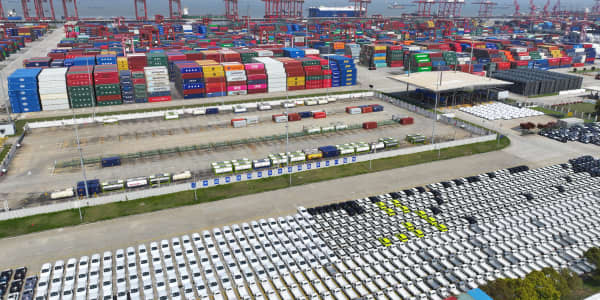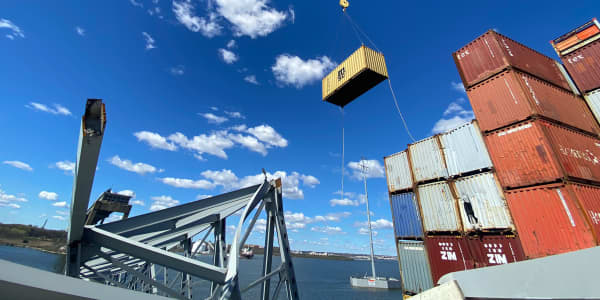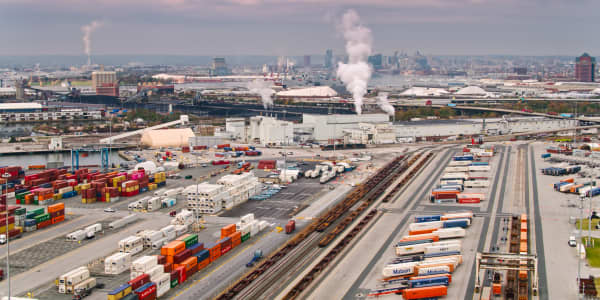The surge in Covid-19 cases in China is impacting the completion of manufacturing orders, according to CNBC Supply Chain Heat Map data.
Logistics managers are warning clients that because of the spike in infections, factories are unable to complete orders — even with U.S. manufacturing orders from China already down 40% due to an unrelenting demand collapse.
Orders for ocean bookings continue to be softer according to SONAR Data.
"With 1/2 or even 3/4 [of the] labor force being infected and not able to work, many China manufacturers can not operate properly but produce less than their optimal outputs," Hong Kong-based shipping firm HLS wrote in a note to clients. "The container pickup, loading, and drayage (trucking) are also affected as all businesses are facing the impacts of COVID. We expect a very soft volume after the Lunar New Year because a lot of factories have slowed production due to the increasing infection, and have to cancel or delay the bookings for the 2nd half of January and also early February."
HLS also noted that "All indications that the Chinese cities are experiencing infection peaks is based on the surge of infected family members, friends, and colleagues, the long lines at the fever clinics at hospitals across the country."
Three major ports across China are experiencing supply chain delivery problems because of Covid, according to the note.
For the Port of Shanghai, the world's number one container port, the report warned that "Cancellations are increasing as many factories can't operate properly due to a lot of workers getting infected with Covid."
The same warning was also highlighted for the Port of Shenzhen, the fourth-largest container port in the world and the city that is home to Apple manufacturers. "The booking cancellation is increasing as many factories can't operate properly due to a lot of workers getting invested with Covid," the report said.

Qingdao, the sixth-largest port in the world, is reported as having factories with only "1/4 labor force and can not ensure normal production."
This data falls in direct contrast with reports from Chinese state media, which have looked to reassure the public that the outbreak is under control. The accuracy of data being released by the China CDC has come under increasing scrutiny around the world.
"Factory orders are down between 30%-40%, which you would think would help in the completion of the products," said Alan Baer, CEO of OL USA. "This is not happening in some areas of the country which is troubling. Then you have to factor in the additional Covid surges after Chinese New Year. Q1 will be challenging."
As a result of the Covid impact on trucking, MarineTraffic is seeing a slowdown in port productivity in Shanghai.
"While China has recently removed its zero-Covid restrictions, the congestion in Shanghai seems to have risen as MarineTraffic data shows that during the first week of 2023 that the average vessel TEU (twenty-foot equivalent unit) capacity waiting out of port limits was 321,989 TEUs, which is the highest amount recorded since April 2022," said Alex Charvalias, Supply Chain In-Transit Visibility Lead at MarineTraffic. "Also, the congestion in Ningbo and Qingdao is rising as well, with 273,471 TEUs and 277,467 TEUs, respectively.
Project44 container wait time data out of the Port of Shanghai shows delays as well.
"The container dwell (wait time) in Shanghai has begun to rise as a result of soaring Covid-19 rates," said Adam Compain, senior vice president of Global Product Marketing at Project44, "These times are expected to continue to rise as cases increase and Chinese New Year causes seasonal delays."
The record congestion was a result of the Covid lockdowns that started on March 28th. It took the city until mid-June to reopen after two failed attempts.
"The reliability of exports out of China has decreased," said Mark Baxa, CEO of the Council of Supply Chain Management Professionals (CSCMP). "The spike in Covid-19 infection rates and the lack of clarity around worker availability to process and manufacture orders has reduced reliability."
According to the HLS report, Ningbo was expected to have peak infections this week. U.S. inventories could be impactedLooking ahead at manufacturing orders and if there will be any increase in the near future, Baer told CNBC that "Transpacific to East Coast port volume will remain under pressure until companies reach a balance between existing inventory levels and their expected sales rate."
Data from WarehouseQuote shows inventories are still at an all-time high "We are still seeing an extremely tight market with limited [third-party logistic] and industrial capacity nationwide," said Jordan Brunk, chief marketing officer for WarehouseQuote. "We are continuing to see consistent increases in storage rates all over the U.S., with the exception of the southeast, which would indicate capacity is still tight across nearly all regions."
CNBC Supply Chain Heat Map data providers are artificial intelligence and predictive analytics company Everstream Analytics; global freight booking platform Freightos, creator of the Freightos Baltic Dry Index; logistics provider OL USA; supply chain intelligence platform FreightWaves; supply chain platform Blume Global; third-party logistics provider Orient Star Group; global maritime analytics provider MarineTraffic; maritime visibility data company Project44; maritime transport data company MDS Transmodal UK; ocean and air freight rate benchmarking and market analytics platform Xeneta; leading provider of research and analysis Sea-Intelligence ApS; Crane Worldwide Logistics; DHL Global Forwarding; freight logistics provider Seko Logistics; Planet, provider of global, daily satellite imagery and geospatial solutions, and ITS Logistics provides port and rail drayage services in 22 coastal ports and 30 rail ramps throughout North America.





